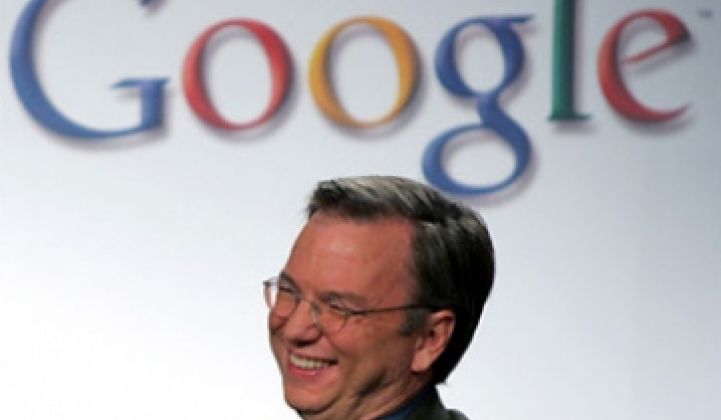I attended an event and opulent spread at the Four Seasons Hotel in Palo Alto, California sponsored by Sierra Ventures on Tuesday evening. Apparently, the recession has not struck the VC community. Yet.
Sierra Ventures has an investment in Miox (water) and Bob Walker, a partner, is an expert in solid-state lighting. Ben Yu, a partner, has looked at solar investments but has not yet pulled the trigger. There were a number of greentech VC investors in the room.
Google's CEO, Eric Schmidt, was the keynote speaker.
Despite Google's interest and commitment to clean energy, this event was geared towards corporate CIOs. Nevertheless, some of Schmidt's observations about data capabilities and mobile computing have some bearing on greentech's biggest problems.
In Schmidt's words, "I've become convinced that we're about to have a big change in industrial society -- it's the age of augmented reality. The computers are supposed to serve us, not the other way around -- they're supposed to just work."
Schmidt talked about the estimated 35 billion devices connected to the internet. He envisions consumer electronics and the IT world merging. "Even in established categories -- the merger is occurring."
Some more observations from Schmidt:
- "The best applications are being built for mobile."
- "The smart phone is the defining, iconic device of our time."
- "Smart phone sales will eclipse PC sales in two years."
- "The web is the biggest platform of them all."
- 'Wow' moments will keep on coming.
The central story of Schmidt's speech involved supercomputer-assisted translation. He cited a demonstration he had just seen where a German-speaking person is talking to an English-speaking person and while they both speak in their native tongues -- they are listening to the other party in their own language. What is happening behind the scenes? Digitized voice is translated to text, text is translated to the appropriate language and the text is then translated to sounds via a speech synthesizer. All in real time. And all with the help of the supercomputers humming in the background of the operation.
It gets better over time because it's a learning application. And nothing prevents it from expanding to 100 different languages being translated at the same time.
So, how does this abundance of data and processing power impact greentech and greentech entrepreneurs? It's this type of number-crunching capability that can:
- Take the upcoming flood of smart grid energy data and provide it to businesses, homes and utilities in an actionable way.
- Perform the computational DNA math that will discover or create the algae strain that might yield refinery-scale volumes of liquid fuel.
- Enable the discovery of materials that will produce the fuel cell membrane or catalyst that will finally allow fuel cells to make economic sense.
- Provide the materials modeling to discover the anode structure that will allow reliable long-term high-cycle energy storage, low-cost biofuel catalysis, or low-cost hydrolysis or desalination membranes
- Discover a new low-cost, highly efficient photovoltaic material
Schmidt concluded: "I'm quite convinced that people are not aware of how disruptive the internet is -- the abundance available is both exciting and terrifying for incumbents."



